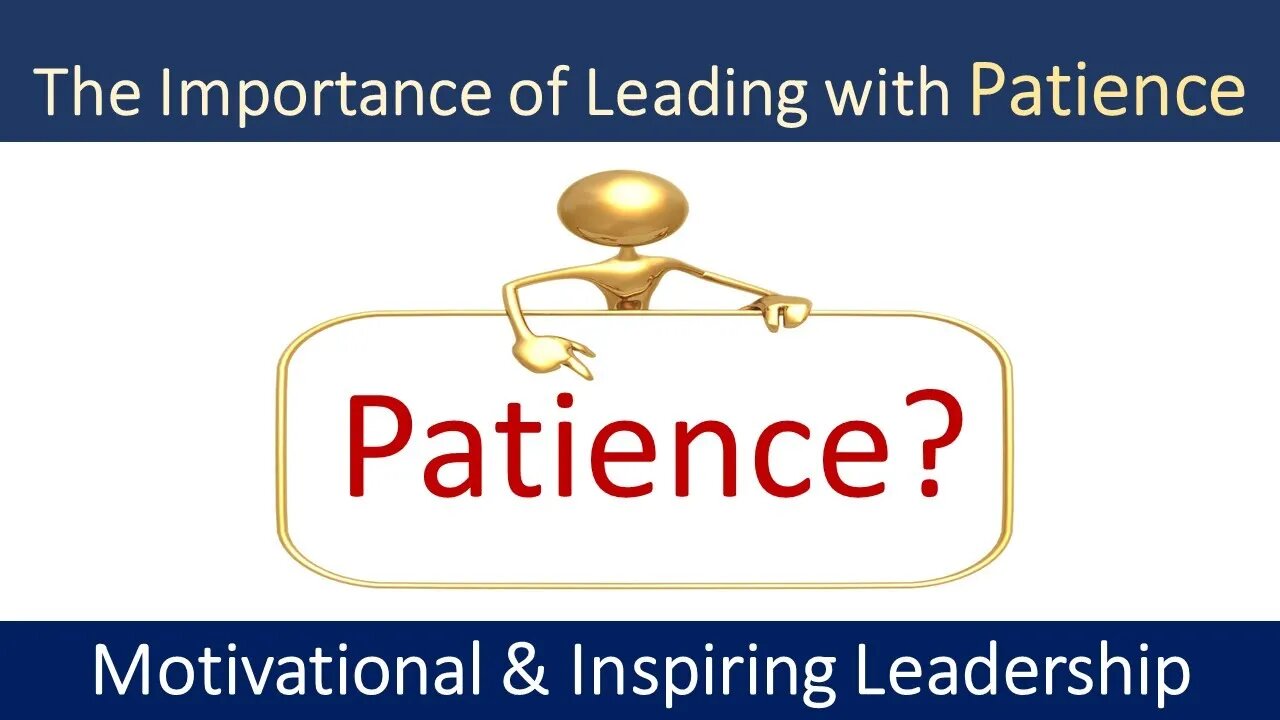Premium Only Content

The Importance of Leading with Patience
Have you ever found yourself fidgeting with impatience while waiting for something to happen? Maybe it's waiting for that promotion at work, waiting for that project to finally come to fruition, or even just waiting in line at the grocery store. We've all been there, right? But have you ever stopped to think about the role that patience plays in our lives, particularly in the realm of leadership?
Today, we're going to explore the concept of patience and discuss why it is so crucial for leaders to cultivate this quality within themselves. Firstly, let's define patience. Patience is the ability to remain calm and composed, even in the face of challenges, delays, or adversity.
It is the capacity to tolerate or accept delays, frustrations, and difficulties without becoming overwhelmed or reactive. Now, you might be wondering why patience matters at all, especially in a leadership context. Well, let me tell you, patience is like the secret ingredient to effective leadership. It's what enables leaders to navigate through complex situations, build strong relationships, and make wise decisions.
Leadership is not a sprint; it's a marathon. It's about taking the long-term view, crafting a vision, and steering the ship towards a desired destination. And for that journey, patience is absolutely essential. Why? Because leaders often face setbacks, roadblocks, and obstacles along the way.
They encounter resistance from others, encounter failure and setbacks, and go through the ups and downs of decision-making processes. Without patience, a leader can quickly become frustrated, lose sight of the bigger picture, and make rash or impulsive decisions that may have negative consequences for their team or organization.
They must understand that people develop at their own pace and have different learning curves. Without patience, a leader may become easily frustrated with their team members, expecting instant results and not giving individuals the space to learn, improve, and contribute effectively.
Patience allows a leader to empower their team members by providing guidance, support, and room to grow. It encourages an environment of collaboration, trust, and continuous development, which ultimately leads to a more productive and engaged team. In addition to fostering team growth, patience is crucial in building meaningful relationships within a leadership role.
Leaders must be able to connect with different stakeholders, understand their perspectives, and work towards mutually beneficial outcomes. When leaders approach these relationships with patience, they allow for open dialogue, active listening, and empathy—qualities that are fundamental to effective leadership.
This cultivates an atmosphere of trust, respect, and collaboration, which in turn promotes a positive and thriving work environment. Patience also enables leaders to make better decisions. In the face of complex and challenging situations, leaders need the ability to pause, reflect, and consider all possible options before making a choice.
Impatient leaders may rush into decisions without gathering enough information or considering all the potential consequences. On the other hand, patient leaders take the time to analyze different perspectives, seek advice from experts, and weigh the potential outcomes. This kind of thoughtful decision-making not only leads to better results but also inspires confidence and trust from those around them.
Now, you might be wondering how you can cultivate patience as a leader. Well, like any skill, it takes practice and conscious effort. One way to develop patience is by being mindful of our reactions in challenging situations. When we feel ourselves becoming impatient, we can take a moment to pause, reflect, and remind ourselves of the bigger picture.
By doing this consistently, we can gradually train our minds to respond with more patience and resilience. Another useful strategy is to shift our mindset. Instead of viewing delays and setbacks as obstacles, we can reframe them as opportunities for growth and learning. Embracing a mindset of patience allows us to see challenges as part of the journey, rather than as roadblocks to our success.
When we have this perspective, we're better equipped to handle setbacks with greater grace and resilience. Additionally, practicing empathy is a powerful pathway to patience. When we put ourselves in the shoes of others, we can better understand their perspectives, motivations, and challenges. This understanding allows us to approach interactions and situations with increased patience and compassion.
In conclusion, patience is a quality that every leader should strive to cultivate. It empowers leaders to navigate challenges, build strong relationships, make better decisions, and foster team growth. By developing and embodying patience, leaders can create a positive and supportive work environment that brings out the best in their team.
-
 LIVE
LIVE
SOLTEKGG
1 hour ago🔴LIVE - Battlefield 6 - Going Pro in RED SEC
214 watching -
 LIVE
LIVE
Midnight In The Mountains™
3 hours agoThe Midnights Play Arc Raiders | Loot Scoot and KILL | Crypto Wallet up n running GO JOIN THE BETA!
127 watching -
 53:25
53:25
X22 Report
4 hours agoMr & Mrs X - Trump Is Using The Same Tactic As Our Founding Fathers To Rebuild America - EP 17
66.9K16 -
 LIVE
LIVE
PudgeTV
1 hour ago🟣 Arc Raiders - Gaming on Rumble | Going Topside w My Daughter’s Husband
74 watching -
 2:05:43
2:05:43
LFA TV
20 hours agoRUMBLE RUNDOWN WEEK 7 with SHAWN FARASH 11.22.25 9AM
130K7 -
 LIVE
LIVE
ttvglamourx
1 hour ago $0.60 earnedGLAMOURX VS CALL OF DUTY LOBBIES !DISCORD
156 watching -
 LIVE
LIVE
DannyStreams
4 hours agoSaturday Morning Tarky
72 watching -
 1:12:53
1:12:53
Wendy Bell Radio
7 hours agoPet Talk With The Pet Doc
26.4K20 -
 LIVE
LIVE
CHiLi XDD
1 hour agoFF7 Remake | Materia Hunting at its finest!
66 watching -
 33:49
33:49
SouthernbelleReacts
20 hours ago $1.43 earnedNOT THE GOPHER 😭🤣 | First Time Watching Caddyshack
13.4K2